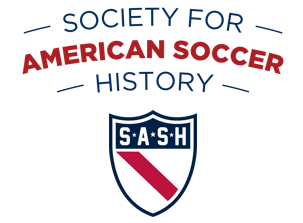Not too many years ago, references to the Oneida Football Club of Boston usually described it as the first soccer team in the United States. Even those of us who were skeptics about this idea were willing to concede the possibility that it might be true.
The Oneidas began play in 1862, a year before the rules of association football were standardized in a famous series of meetings at the Freemasons Tavern in London. This date has sometimes been cited as proof that the game they were playing could not have been soccer, and there is a lot of logic to that argument. However, the Oneidas came from wealthy families, and could have been in contact with their English counterparts. At least one of them had been to England. Gerrit Smith Miller had accompanied his father, a gentleman farmer from near Syracuse, N.Y., on cattle-buying trips to England.
The participants in those Freemasons Tavern meetings did not invent a new game, but rather standardized the rules of a game that was already being played in similar forms at various English schools and colleges. The possibility that Miller or one of the other Oneidas could have obtained a copy of the rules of one of those forms while they were in England is the reason why even skeptics have considered it not impossible that the Oneidas might have been playing an early prototype of soccer.
However, accounts found in recent years by Melvin I. Smith of Asheville, N.C., the foremost researcher into 19th-century American games in various types of football, have indicated that the game that the Oneidas were playing was much more like rugby football than like association football (despite the fact that the monument on the Boston Common near where the Oneidas played features a soccer ball). Because rugby and association football were not yet standardized, Smith categorizes the game the Oneidas were playing as the “American carrying game” (Smith uses the terms “carrying game” and “kicking game” much the way some others have used “handling game” and “dribbling game”). By the early 1870s, when it was the usual form of football being played at Harvard, the Oneidas’ game was referred to as the Boston Rules Game.
The Oneidas were prep school students, primarily from the Dixwell Latin School, but with a few players mixed in from other schools. Dixwell Latin had played football for almost 10 years before the Oneidas were formed under the leadership of three students, Miller, Huntington Wolcott and Clifford Watson, in November 1862. The Oneidas’ games, all played in October or November, took place in an open section of the Boston Common. They played three seasons, finally disbanding in November 1864, although several of their main players graduated from Dixwell in June 1864 and didn’t play in that final season. During those three seasons, they were undefeated and unscored upon in 10 games against teams from the Boston Public Latin School, the Boston English High School, Dorchester High School and the Roxbury Latin School.
Regardless of which football code the Oneidas’ game is called a forerunner of, the team should occupy an honored place in the histories of American soccer, American football and American rugby. This is because the Oneidas were the first football team of any type in the United States to be organized on a continuing basis, week to week and season to season, rather than just for the day or for the game. That monument on the Boston Common lists the names of the players on the back. Underneath the names, someone scrawled in what looks like crayon a message to present-day soccer players: “They are watching you.” This remains true no matter which type of football the Oneidas played.
So, it seems that Oneidas weren’t really the first American soccer team. Even so, they were an important stepping stone in the direction of the American soccer that we know today.
A version of this article first appeared at Roger’s Big Soccer blog on Dec. 5, 2011.
